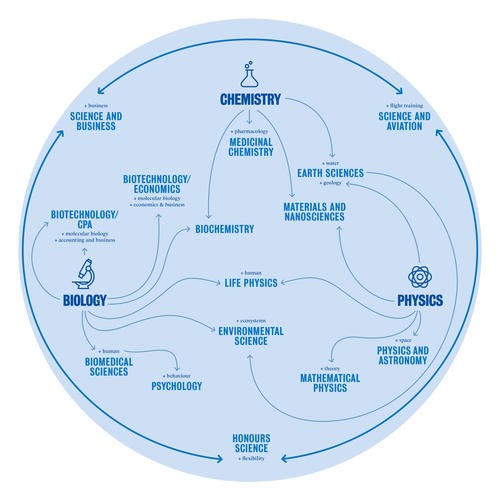
Scientists are curious, analytical people who strive to understand the world through observation. Whether you find a particular aspect of science fascinating, have a natural talent for the field, or you simply enjoy understanding how things work, pursuing the science pathway is an excellent option to consider for post-secondary!
Suggested Courses
Regardless of what particular field you’re interested in pursuing, you’ll need to make sure you’re taking the right courses to fulfill prerequisites requirements for your intended program. For the majority of science-based programs, applicants will be expected to have studied the three core sciences (Biology, Chemistry and Physics), as well as Advanced Functions and Calculus, in grades 11 and 12. Depending on your specific field interests, you may want (or need) to take additional courses, such as Kinesiology, Earth and Space Science, or Computer Science, to familiarize yourself with the specialized content &/ meet post-secondary admission requirements.
Below is a full list of suggested OVS courses for students pursuing the Science pathway:
Grade 11
MCR3U – Functions
SBI3U –Biology
SCH3U – Chemistry
SPH3U –Physics
Grade 12
ICS4U – Computer Science
MCV4U – Calculus & Vectors
MDM4U – Data Management
MHF4U – Advanced Functions
PSK4U – Kinesiology
SBI4U – Biology
SCH4U – Chemistry
SES4U – Earth & Space Science
SPH4U – Physics
As always, it helps to earn high marks in the courses related to your field. Overall admission averages will vary by school and by program, but aiming for an 80% average is a good place to start, as the Sciences can be highly competitive.
Potential Programs
The scientific field includes many potential streams for you to choose from. From general degree programs in areas like Biology, Chemistry or Physics, to highly specific programs, like biomedical toxicology. There are also programs that allow you to start off general, and choose your specialization later in the degree. Whether you know exactly what you want to study or you’re still not sure, there is a program that will suit your needs. We’ve compiled a list of some of the most popular science streams:
Biology
Chemistry
Biochemistry
Environmental Science
Geology
Physics
Nursing
Computer Science
Astronomy
Health Science
Kinesiology
Life Sciences
Psychology
Engineering
Of course, these are still fairly general program areas, any one of which can become even more specialized based on specific interests. The graphic shown here identifies how various specialized programs overlap between the three major divisions of science:

Recommended Post-Secondary Institutions
Some students may be set on attending either university or college, but did you know it can be beneficial to do both? By combining the theoretical knowledge offered in a university degree with the hands-on skills offered by college programs, joint programs can uniquely prepare students for success.
Here, we’ve compiled a list of Canadian institutions with well-regarded science programs:
Universities
McMaster University
University of Guelph
University of Toronto
University of Ottawa
McGill University
University of Alberta
University of British Columbia
Colleges
Seneca College
Centennial College
Fanshawe College
Georgian College
Algonquin College
Northern College
St. Lawrence College
If you are seriously interested in pursuing further education in the sciences, it’s a good idea to check out specific institutions and search through their full program list to get a clearer picture of what’s out there. If you’re interested in attending university in Canada, this site can help you search for various programs. If college is what you’re after, this site lets you search through all the programs offered by Ontario colleges.
Scholarships & Bursaries
It’s no secret that post-secondary study can be expensive, but in modern society, it’s considered an investment towards a brighter future. But who doesn’t want ‘free’ money? Scholarships and bursaries are great ways to ease the financial burden post-secondary study inevitably brings. While most schools give first-year students entry scholarships based on earning good high school averages, it’s important to know that there are many other scholarship and bursary opportunities available as well, which range in value and entry criteria.
Generally speaking, scholarships are typically awarded in acknowledgement of academic excellence, while bursaries are allocated based on financial or situational need. Either may be given out by the university itself or by an external source. For school-specific scholarships and bursaries, it’s best to browse the university website for a dedicated page that explains the criteria and application processes for their awards. For externally offered scholarships, Scholarships Canada is a general database that lists hundreds of searchable opportunities each year. It’s important to apply for these awards early, as the application deadlines vary widely. More tips on filling out applications are available here.
The application process itself also varies greatly. Some will involve writing an original essay or creative piece based on specific criteria, others will require you to provide a series of specific documents proving your academic or financial standing, while a select few will simply ask you to fill out your contact information for a luck of the draw pull. In general, the applications whose processes are more complex, and whose criteria are more specific, are the ones you have a greater likelihood of being awarded. Scholarships and bursaries do lighten the financial burden of higher education, but they also require time and effort in finding and applying for ones that apply to your specific situation.
Career Opportunities
A Bachelor of Science degree can lead to many interesting career opportunities, but which one is right for you? Just like picking a degree, it’s important to consider your strengths, skills and personal interests. After all, if you love what you do, you’ll never work a day in your life! Here are just a few of the hundreds of potential careers a Bachelor of Science graduate might choose to pursue:
Engineer
Nurse
Pharmaceutical Chemist
Laboratory Technician
Veterinarian
Marine Biologist
Anesthesiologist
Occupational Therapist
Doctor
Teacher/Professor
Zoologist
Conservation Biologist
Computer Programmer
Artificial Intelligence Designer
Epidemiologist
Genetic Counsellor
Looking for career paths that are more specific to your future degree? The University of British Columbia has compiled an extensive list of the different career paths you can take with specific Bachelor of Science degrees. And don’t forget, there are always opportunities to further your education after completing your Bachelor of Science degree. You can pursue a Master’s degree or PhD to study a more specialized topic; you can enroll in a professional program, like teacher’s college, medical school, or dental school; or, you can enroll in a specialized college program to obtain hands-on skills in your chosen field.
At the end of the day, remember that the path you choose is never set in stone and the decision to change pathways should never be regarded in a negative light. Instead, consider a shift in focus or discipline as just another way of expanding your skill-sets and areas of knowledge. And, as always, OVS is here for you if you find yourself in need of prerequisite courses or upgraded marks to embark down a new path towards your ideal future.
